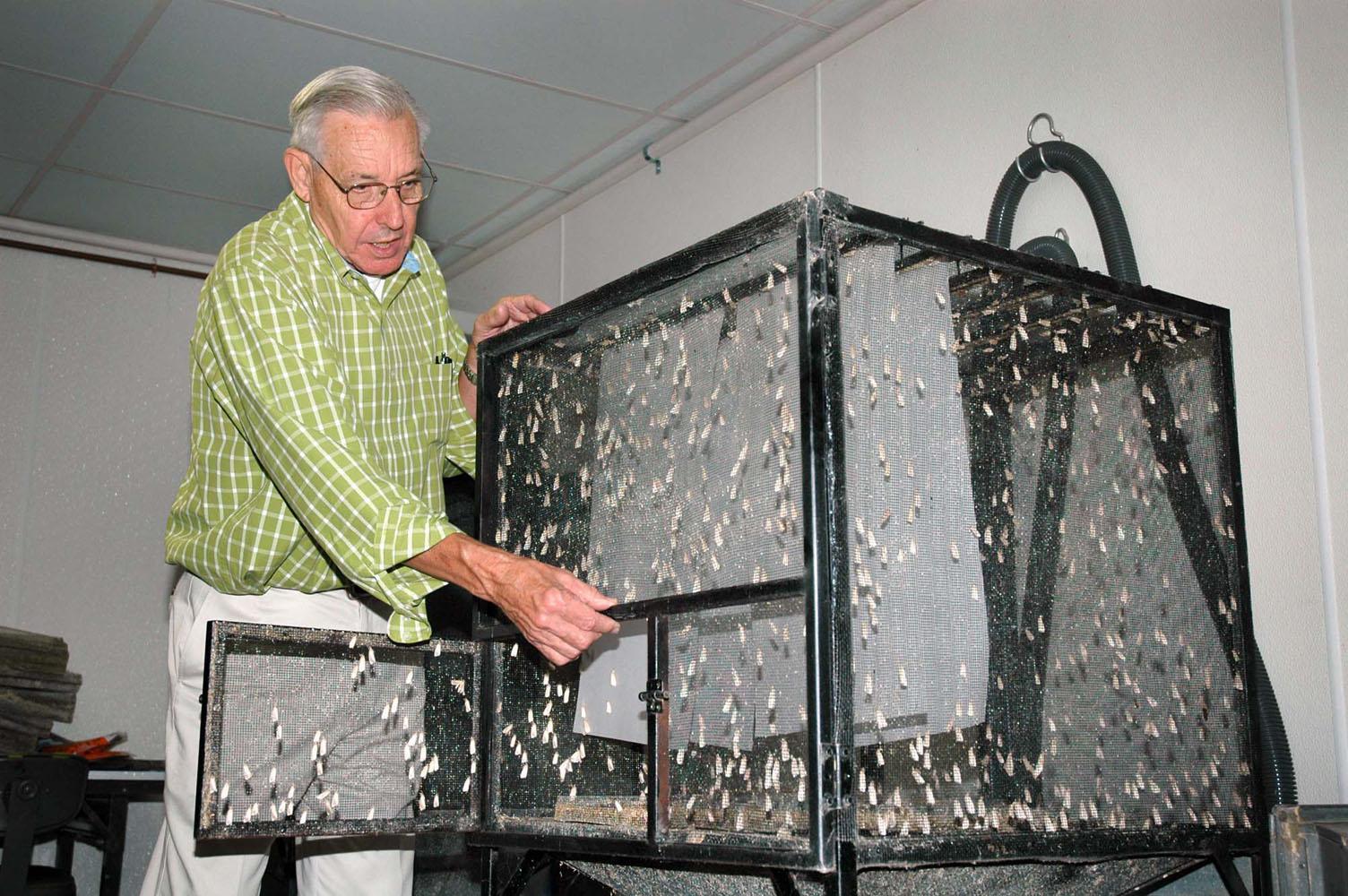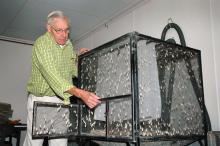Information Possibly Outdated
The information presented on this page was originally released on October 26, 2006. It may not be outdated, but please search our site for more current information. If you plan to quote or reference this information in a publication, please check with the Extension specialist or author before proceeding.
Rearing insects has international appeal
MISSISSIPPI STATE -- Universities often offer parenting classes, but Mississippi State University recently held an international workshop focused on rearing the tiniest offspring: insects.
Initiated in 2000, MSU has hosted nine intensive short courses to teach people from all over the world the lessons crucial to rearing insects in a laboratory setting for research and commercial sales. The workshop is the only formal education on insect rearing provided by any university in the world.
“This workshop gives participants a broad view of all the components to be successful in insect rearing,” said Frank M. Davis, workshop coordinator. “It stresses that insect rearing is a science and an art.”
Davis is an emeritus adjunct professor in MSU's Department of Entomology and Plant Pathology and retired U.S. Department of Agriculture entomologist with the Agricultural Research Service. He said most universities do not have insect rearing facilities, or insectaries, as large or as sophisticated as the ones at MSU and the adjacent USDA facility.
“Having people here with rearing expertise gives us a core group of lecturers with lots of experience, and then we supplement with the best insect-rearing talent from around the country,” Davis said. “Over the years, presentations have improved and more materials are available. The workshop is a real team effort from the van drivers to the lecturers to the department's support.”
The workshop covers the major components of a successful rearing program. They include artificial diets, environmental biology, rearing systems, insect pathology (diseases and microbes that contaminate artificial diets), colony genetics, quality control, insectary design, insectary management, safety and health issues.
“We have accumulated an enormous amount of information while providing these workshops. It is enabling us to compile a college textbook on the principles and procedures for rearing high quality insects,” Davis said. “After its release in 2007, MSU will be able to use the money from book sales plus funds generated from the workshop to help fund graduate studies in insect rearing.”
MSU's collection of resources dedicated to its Insect Rearing Center grew significantly this fall. Pritam Singh, described by Davis as “one of the pioneers in insect rearing,” donated his personal research library to the university.
Davis said the collection includes a copy of the first article published on artificial diets for an insect, a blow fly. The 1908 article was by a Russian entomologist. About 6,500 reprints of papers dealing with rearing insects are in the collection, which concludes in 1992.
“We plan to add to his library and are in the process of computerizing the information so that it can be searched by author, insect species and keywords,” Davis said. “This gives people rearing insects access to much more than just the 8-pound manual we provide in the workshop.”
Participation in the workshop costs $975, plus travel and lodging.
“This is not an inexpensive workshop, but we have had participants return two or three times,” Davis said.
Participants come from a variety of backgrounds. Many work with private companies that develop insecticides or insect-resistant plant varieties. Some produce beneficial insects for organic farming and similar needs. Still others produce insects, such as butterflies, for special exhibits.
Carlos White is an entomologist who became a businessman as the founder of Insect Lore, a California-based company that has grown beyond selling moths to insecticide companies.
“Companies would need insects for research projects sporadically, so we started growing insects to take to schools during the ‘off' season,” White said. His company now targets schools and retail stores with its nature and science activities.
Along the way, White has found unique opportunities, such as providing a thousand butterflies to be released at the premier of the 1970s movie, “Butterflies are Free.” He also provided larva in various stages of development for NASA to take into space to study butterfly development.
“It took years to figure out the best diet for the butterflies (to prevent deformities),” said White, who recently attended his second insect rearing workshop. He is finding much more information available now than when he started his business.
“With all these specialists gathered together at this workshop, we can learn some of the leading edge methods, the best antibiotics to use, and information about sanitation and insectary design. The biggest challenge now is anticipating future needs,” he said.
Bill Fisher, an insectary manager with BASF in North Carolina, has been involved as a lecturer with the workshop since its inception. After receiving his undergraduate degree in biology in California, Fisher came to MSU for a master's in entomology with an emphasis in insect rearing before getting his doctorate at the University of Florida. He said the workshop “fills a worldwide need” for this training.
“At the workshops, I help participants consider management and design decisions,” Fisher said. “This is an intense week, and a special bond forms between all the participants and instructors. More than anything, it establishes lines of communication with the instructors and students for future needs and questions.”
Fisher said people who are successful have the insect equivalent to the gardener's green thumb.
“People who rear insects have a nurturing intuition,” Fisher said. “The insects are produced in high numbers under hospital-like conditions. It is important to protect the employees' health as well as that of the insects.”
Sheri Svehla is working on her master's in entomology at Nebraska. She had eagerly anticipated the workshop for more than a year and was the first to enroll in the 2006 course.
“I have been doing aphid research in an insect ecology lab and needed to know more. An Internet search for ‘insect rearing' lead me to this workshop, which has exceeded my expectations,” she said.
Svehla has future plans to rear Salt Creek Tiger beetles, which are endangered insects located in the Lincoln, Neb., area.
Workshop participant Natalya Abdrashitova, a native of Russia, works in a new commercial business in Hawaii producing beneficial insects for farmers. An entomologist for 10 years, she felt the need to learn management issues and the business aspects of operating an insectary.
“The tour of these (MSU and USDA) labs was helpful,” she said. “I have learned a lot from the participants and speakers.”
Insect lab technician Evelyn Scherrer came from Switzerland for the workshop. Her boss attended a past workshop and felt that she also would benefit from the training. Their lab produces 30 different species of moths, aphids, whiteflies, thrips and plant bugs for pesticide testing.
“The workshop helps me understand why we do things the way we do them,” Scherrer said. “Now I believe my boss and understand his reasons. I won't argue with him as much in the future.”
Contact: Dr. Frank Davis, (662) 325-2983



